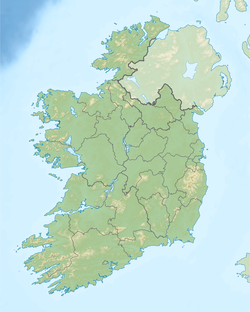Killulta Church
| Killulta Church | |||||||||
|---|---|---|---|---|---|---|---|---|---|
| Kildimo Church | |||||||||
Cill Ulta | |||||||||
 | |||||||||
| 52°37′44″N 8°50′10″W / 52.6290°N 8.8360°W | |||||||||
| Location | Glennameade, Kildimo, County Limerick | ||||||||
| Country | Ireland | ||||||||
| Denomination | Catholic (pre-Reformation) | ||||||||
| History | |||||||||
| Dedication | Saint Ultan (?) | ||||||||
| Architecture | |||||||||
| Functional status | inactive | ||||||||
| Style | Celtic | ||||||||
| Years built | 9th century AD? | ||||||||
| Specifications | |||||||||
| Length | 5 m (16 ft) | ||||||||
| Width | 5 m (16 ft) | ||||||||
| Nave width | 3 m (9.8 ft) | ||||||||
| Number of floors | 1 | ||||||||
| Floor area | 15 m2 (160 sq ft) | ||||||||
| Materials | stone, mortar | ||||||||
| Administration | |||||||||
| Diocese | Limerick | ||||||||
| |||||||||
Killulta Church is a medieval church and a National Monument in County Limerick, Ireland.[1]
Location
The church is located 1.6 kilometres (0.99 mi) west-northwest of Kildimo village, in the western part of the Maigue valley, southwest of Dromore Lough and Bleach Lough.[2]
History
Killulta church is believed to be one of the oldest stone churches in Ireland.[3]
Samuel Lewis incorrectly claimed it was built by the Knights Templar in 1290. However, others date the church to pre-1100, even as early as the 5th century AD. Most scholars date it to the 9th century.
Local historian Mairtín Ó Corrbhuí records that a bronze pin and bronze sword were found near the church.
The name is believed to mean "church of the Ulsterman" or "church of Saint Ultan."[4]
It was also known as Kellallathan (cealla leathan, "broad church").[5][6]
Church

Killulta measures 5 × 3 metres on the inside, with walls 1 metre thick. It is constructed of large stones and has a plain doorway and triangular-headed east window.[7][8]
References
- ^ "Limerick City and County Museum". museum.limerick.ie.
- ^ Begley, John (7 July 2017). "The Diocese of Limerick, Ancient and Medieval". Browne & Nolan – via Google Books.
- ^ "Proceedings of the Royal Irish Academy: Biological, geological and chemical science. Section B." The Academy. 7 July 2017 – via Google Books.
- ^ "Kildimo-Pallaskenry Church Ruins". www.limerickdioceseheritage.org.
- ^ MacCotter, Paul. "Parish, pastoral care and tuath in the diocese of Limerick". Journal of the Royal Society of Antiquaries of Ireland.
- ^ MacCaffrey, James (7 July 2017). "The Black Book of Limerick: With Introduction and Notes". M. H. Gill & Son – via Google Books.
- ^ Leask, Harold Graham (7 July 2017). "Irish Churches and Monastic Buildings". Dundalgan Press – via Google Books.
- ^ Publications, Robert Nicholson (7 July 1983). Nicholson's Guide to Ireland. R. Nicholson Publications. ISBN 9780905522715 – via Google Books.

